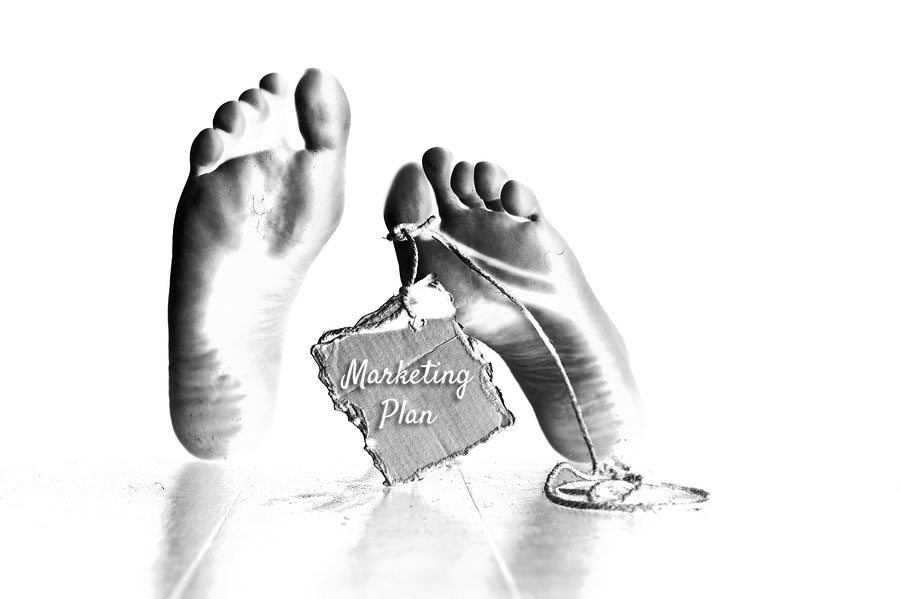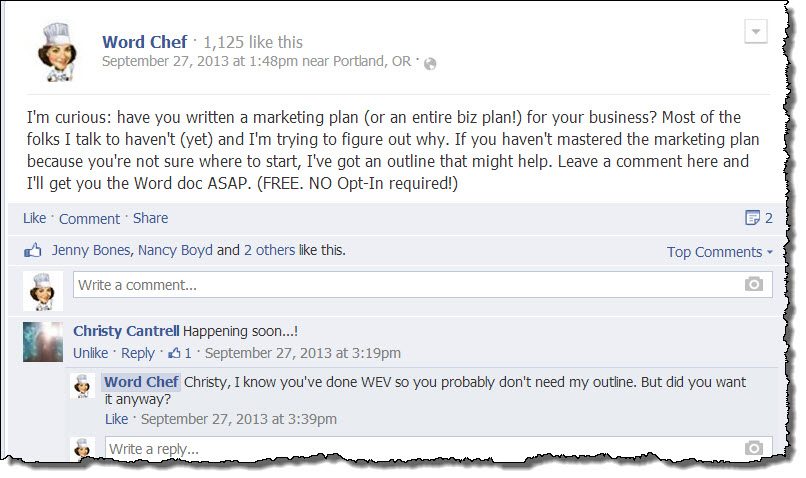I have a confession: I’ve never really enjoyed writing marketing plans.
There’s math, and a bazillion details and research.
And planning feels so…corporate. I did a LOT of it when I headed up various marketing departments earlier in my career.
After all, we weren’t going to be able to spend our multi-million dollar budgets without a plan.
But for solo biz owners, there doesn’t seem to be as much as reliance on this process.
Just like eating healthy and exercising, marketing plans are things that everyone knows they need to be doing, but very few actually take the time to do.
So let’s get this over with: The standard marketing plan — at least for the micro biz owner — is dead.
And I think I know why.
Common complaints I’ve heard from my peers and clients:
- I never know where to start
- I never follow my plans anyway, so why bother?
- Planning just feels so…left brained. And I’m more of a right-brained person.
- Flying by the seat of my pants kinda works
- I have no idea how to be strategic (and I really don’t want to learn)
You get the idea.
Maybe one of those reasons belongs to you, too?
You wouldn’t be alone! Last fall, I posted a series of questions on social media asking people about where they were in the planning process. And whether or not they’d like an outline to help them get started.
I had several takers just on this one status update:
What’s interesting about all these commenters is that most of them (when I followed up to see if they needed help) said they were too busy with other things to focus on the planning.
It was more than just the upcoming holidays.
The lack of business and marketing planning is an all too common problem among solo biz owners.
I even blogged about the topic to try and explain why having a plan was a good idea.
But something was obviously still amiss.
As I continued to dig further, I realized it had more to do with how people felt about the the terms and words we use to describe pieces of the plan — and their desire to figure that stuff out — than the process itself.
The more I worked with my clients (especially in my group program, The Digital Dining Room), the more I realized that we needed a new way to think and talk about this thing we call The Marketing Plan.

So I used an analogy that I thought might appeal to the more right-brained folks in the room: the process of writing a novel.
Novelists are storytellers on a magnitude much bigger than most of us. It can take months to write a good novel.
And it takes a lot of pre-work and sweat to put together a story that keeps us turning the pages.
What an Author Needs to Know to Write Her Novel
You’ve got to know who your characters are — inside and out. These include the protagonist (or hero), the antagonist (or villain), and the mentor (among others).
The hero of every story has a goal that she needs to achieve. And there’s always something (or someone) standing in the way of that.
Your client is the hero and you’re the mentor.
As a mentor, you were also once the hero of a story. You’ve got super powers and an origin story that needs to be understood, too. (Branding!)
You need to know what tools you’re using (your products and services) to help your hero/client get where she needs to go.
You’ve got to understand the landscape of the story — where does it take place? When? (Your market and competitors.) What does that mean for how the story will unfold?
And most important, you’ve got to figure out where your story is ultimately headed — its plot, theme and moral. (You might also call this your sales funnel.)
These are all pieces that a novelist would figure out before she starts writing down the story.
So even right-brained folks still have to strategize and reverse engineer a story. How does the hero get from A to B to C? What happens in between those steps? What challenges does the hero have to overcome?
You plan these things out. And then — if as you write the story, it decides to veer off and go in a new direction — you’ve at least thought through whether that’s a good idea, or if it’s okay to alter your original plans.
Yes, your mission and vision can and will grow/evolve. But knowing where you think you want to go is the best way to start your business off right.
If this approach sounds like it might work for you, come check out the Digital Dining Room. The Business Story Framework is the underlying piece of our work there.
***
NOTE: Alaia Williams, the founder and producer of At the Helm events, recently interviewed me about my approach to planning. Go ahead and take a listen.













I can empathize with all the right-brained solopreneurs trying to tackle the task of writing a marketing plan. It feels like being commanded to dig a deep ditch the entire circumference of hell. Or being extraterrestrial on a planet of humans. You know, like having three eyes when everyone around you has two!
Using a storytelling framework sounds like something right-brained folks can wrap their brains around. 🙂
Heading over to At the Helm to catch your podcast interview … 🙂
I’m the worst about writing a marketing plan and sticking to it. I like the idea of a story. 🙂
Love the idea of creating a story. It’s a great way to think through how to craft an amazing online course too, for anyone who wants to but feels stuck. In fact, I like this structure so much I use it to write my contracts- takes the stuffiness out.
Oooh! I’d love to read THOSE contracts. What a fab idea. Thanks for reading and chiming in, Dina!